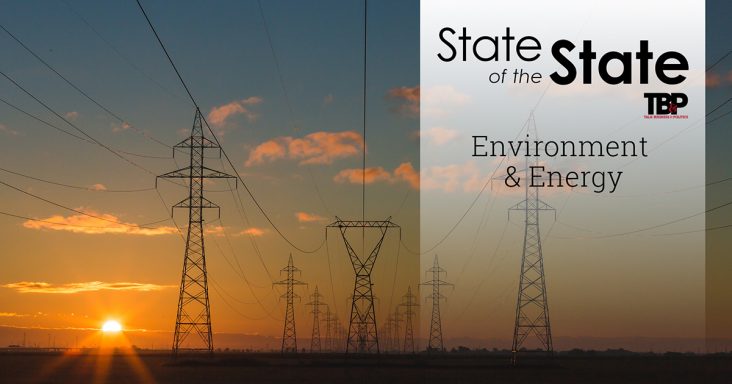State of the State 2023: Energy leaders hopeful this year after multiple 2022 surprises
by January 26, 2023 12:14 pm 1,311 views

Energy industry officials look to greater stability, advanced energy investments and beneficial policies after facing multiple unexpected challenges last year. Surprises included Russia’s invasion of Ukraine and price volatility that impacted inflation, consumers and production investments to meet demand.
Still, advanced energy projects endured amid the expiration of an Arkansas rule ensuring solar array owners maintain projected savings. The grandfathering rule for solar projects expired Dec. 31; however, in late December, the Arkansas Public Service Commission issued a rule to extend it. The rule still needs legislative approval.
Lauren Waldrip, executive director for the Arkansas Advanced Energy Association, was surprised by the rule expiration but said she appreciated the commission’s new ruling, which can be referenced in the rulemaking process. If legislators approve the rule, grandfathering would be extended through May 31, 2040.
Waldrip said seeking the rule approval is a priority for the 2023 legislative session. Another is defending existing law that’s helped the solar industry, including the 1:1 net metering rate. She’s previously noted the state is a leader in solar because of its policies. She said Arkansas leads in planning solar projects compared to other states within the footprint of the regional transmission organization Midcontinent Independent System Operator.
ENERGY MYTHS
Waldrip expects 2023 to be a better year for the industry because of the federal resources from which the state can take advantage. The industry will benefit from the Inflation Reduction Act, which extended the federal tax credit for solar projects. Waldrip said Arkansas will benefit from the law because it requires project components to be sourced locally and that eastern Arkansas steel mills could provide for the projects.
Along with the unexpected rule expiration, Waldrip noted some industry misconceptions, such as the affordability of electricity produced by renewable energy compared to coal. She said renewable energy sources are more affordable than coal, and the prices have not risen in recent years.

“To debunk that affordability myth, renewables can play a very competitive role as we diversify our energy portfolio,” said Waldrip, adding that renewables comprise about 2% of Arkansas energy production.
Another misconception was renewables will become the state’s sole energy source.
“No one is saying that,” Waldrip said. “That would be an awful idea. … Renewables are simply one piece of the solution that, as we diversify and address these growing energy needs and demands, can also help us increase our national security, too.”
DEMAND REBOUND
Gifford Briggs, Gulf Coast region director for the American Petroleum Institute, said the global impact of Russia’s invasion of Ukraine and the effect prices had on inflation were surprises last year. The latter showed the impact energy has on the overall economy, while the previous showed the industry’s global significance amid the shuttering of natural gas pipeline Nord Stream 1 that cut off energy supplies to Europe.
He said economic issues, such as supply and demand and price volatility, were top industry topics in 2022. Others included the impact energy prices had on inflation and consumers and the industry’s response to meet demand as the global economy came out of the pandemic. He said the global economy “started roaring back” in 2022 after a recovery and lock-down state in 2021.
“People were back on the roads and traveling,” Briggs said. “The demand for energy began to rebound very quickly. The need for more energy production was being felt across the globe.”

For 2023, he hopes to see stability in energy pricing and the financial markets to encourage industry activity and investment. He noted volatility in pricing and the markets aren’t good for the industry.
“We need predictability and stability to be able to plan out investments and ensure we are able to produce resources in a manner that is sustainable,” he said. “Hopefully, 2023 will bring that.”
CLEANER ENERGY PUSH
Briggs also expects investments into cleaner energy projects designed to reduce emissions, including carbon capture and sequestration and hydrogen. He said Arkansas is part of a three-state initiative seeking federal grants to develop one of four hydrogen hubs. The bid for the HALO Hub recently moved to the next phase, allowing the three states to submit a full project application.
“We’re looking to 2023 to hopefully be a year of progress as we move forward and capitalize on some of these technologies that have been in development and can begin to see, not an energy transition but an energy addition,” Briggs said. “We’ll continue to rely on oil and natural gas as major mainstays of our energy mix.”
He said industry prices and production have rebounded since the pandemic lows and are nearing or in line with pre-pandemic levels.
“The health of the industry right now is strong,” he added. “We’re resilient, and we know we’re going to continue to provide the energy that our country needs …”
He said a challenge the industry faced in 2022 was the lack of a five-year offshore leasing program, and it was the first time no lease sales were issued.
“It took an act of Congress to get some of the lease sales moving forward,” said Briggs, citing the Inflation Reduction Act that allowed lease sales in the previously approved program to commence.
He said the industry is focused on “getting the policies of the administration to match the will of the people.” He explained that the industry relies on federal permits, but they aren’t being addressed quickly enough to allow the industry to meet existing consumer demand.
“We want Arkansas to be able to play a role in carbon capture and emissions reduction technology and the growing market in hydrogen,” he said. “We’re looking to work with the legislature and the governor to take steps forward for Arkansas to get primacy so that Arkansas can do its own permitting for carbon capture programs.”
The U.S. Environmental Protection Agency is responsible for issuing the permits currently. Arkansas is among multiple states seeking primacy, said Briggs, adding that carbon capture will be significant for U.S. manufacturing.
Editor’s note: The State of the State series provides reports twice a year on Arkansas’ key economic sectors. The series publishes stories to begin a year and stories in July/August to provide a broad mid-year update on the state’s economy. Link here for the State of the State page and previous stories.
